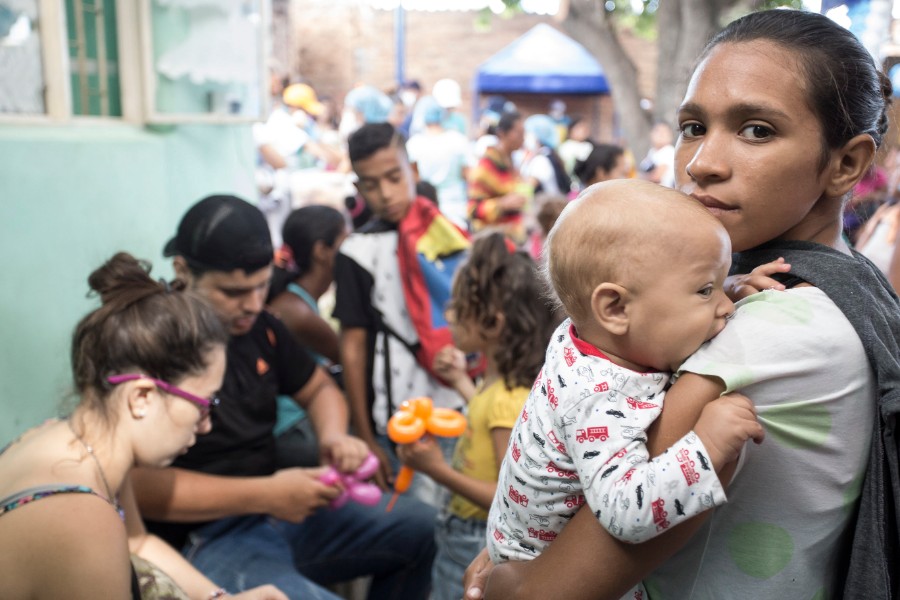Fall Out of COVID-19 Severely Affects Food Security of Migrants in South America

PANAMA CITY – Two thirds of the 3 million Venezuelan migrants in Colombia, Ecuador and Peru who have seen their jobs disappear and their incomes plummet during the pandemic will see their food insecurity worsen in 2020, according to the United Nations World Food Programme’s COVID-19 projections.
Latin America and the Caribbean is expected to register an alarming 269 percent rise in the number of people facing severe food insecurity when compared to 2019 – the highest relative increase globally. Nearly 16 million people*, which includes 1.9 million Venezuelan migrants, will this year face a critical situation that warrants urgent attention.
“We are worried about the millions who are suffering the impact of the pandemic in our continent,” said Miguel Barreto, U.N. World Food Programme’s Regional Director for Latin America and the Caribbean. “Without enough work and income, hunger is what’s next for them. We must act now. We can’t leave anyone behind.”
In the case of migrants, the projection combines moderate and severe food insecurity and is based on a remote survey the U.N. World Food Programme conducted between April and May 2020 on the impact of COVID-19 on their lives. Economic indicators for Latin America and the Caribbean were also analyzed following the outbreak.
With predictions that gross domestic product (GDP) in the region will shrink by 9.1 percent** – the biggest contraction in a century, estimates suggest that poverty, extreme poverty and unemployment will affect millions more people this year.
Migrants are particularly vulnerable as they are not covered by national social protection programs which provide a safety net in times of crisis. The most recent U.N. World Food Programme survey found that 7 out of 10 migrants in these three countries were worried about feeding themselves and their families, a substantial increase compared to previous assessments. The proportion of migrants who only had one meal or did not eat the day before the interview increased 2.5 times compared to the pre-coronavirus period.
“To halt the increase in poverty and hunger for migrants and other vulnerable groups, we need lasting solutions. It is important to incorporate migrants and other groups into national social protection programs as the Government of Colombia has started doing with our support. For this we count on the support of our international partners and of financial institutions,” added Barreto.
To cope with the growing wave of hunger, the U.N. World Food Programme needs an additional $328 million in 2020 to reach 3.5 million people who have been affected by the COVID-19 crisis in Latin America and the Caribbean. To assist vulnerable Venezuelan migrants in Colombia, Ecuador and Peru, the U.N. World Food Programme requires $120 million of the total figure.
Additional information for journalists:
In Colombia, the U.N. World Food Programme is assisting nearly 400,000 people a month with cash-based transfers or food rations, including migrants, members of indigenous communities, victims of armed violence, children in school feeding programs, and people affected by COVID-19. The U.N. World Food Programme plans to assist an additional 550,000 people, subject to the availability of funds, to support and complement national crisis response efforts.
In Ecuador, the U.N. World Food Programme provides vouchers to a monthly average of 96,000 migrants and, due to the crisis, has extended their duration from April to June for 20,000 families. In addition, the U.N. World Food Programme assists about 250 Ecuadorian returnees a month in temporary community kitchens in Pichincha province, and plans to assist 5,000 people in shelters and community kitchens during the pandemic.
In Peru, the U.N. World Food Programme is providing logistical support to the government to deliver nearly 240,000 food kits to vulnerable households in Lima and Callao, and food baskets to 20,000 families quarantining at home in 23 regions of the country. The U.N. World Food Programme also plans cash transfers for 98,000 vulnerable people, including migrants, who do not benefit from national social protection programs.
*The regional projection has been calculated for 11 countries where the U.N. World Food Programme has a presence and for small developing states in the Caribbean. The figure includes 1.9 million Venezuelan migrants in moderate and severe food insecurity in Colombia, Ecuador and Peru.
**As per the Economic Commission for Latin America and the Caribbean (ECLAC)
Remote survey report on the impact of COVID-19 on market access, food security and livelihoods
###
The United Nations World Food Programme is the world’s largest humanitarian organization, saving lives in emergencies, building prosperity and supporting a sustainable future for people recovering from conflict, disasters and the impact of climate change.
Follow us on Twitter @WFPUSA and @wfp_media




